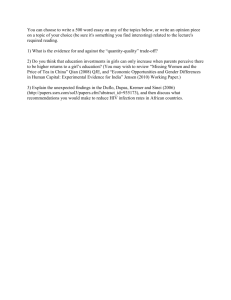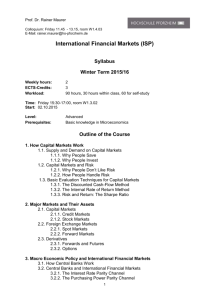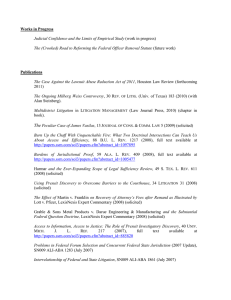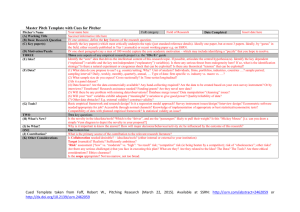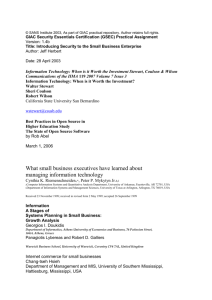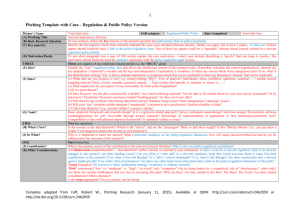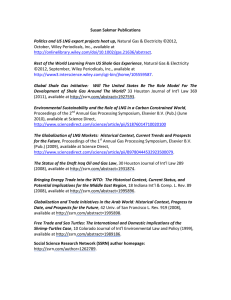In this class we will study the procedural laws that... and federal courts. Lawsuits are not the only method for... Civil Procedure Fall 2015 - Professor Lonny Hoffman
advertisement
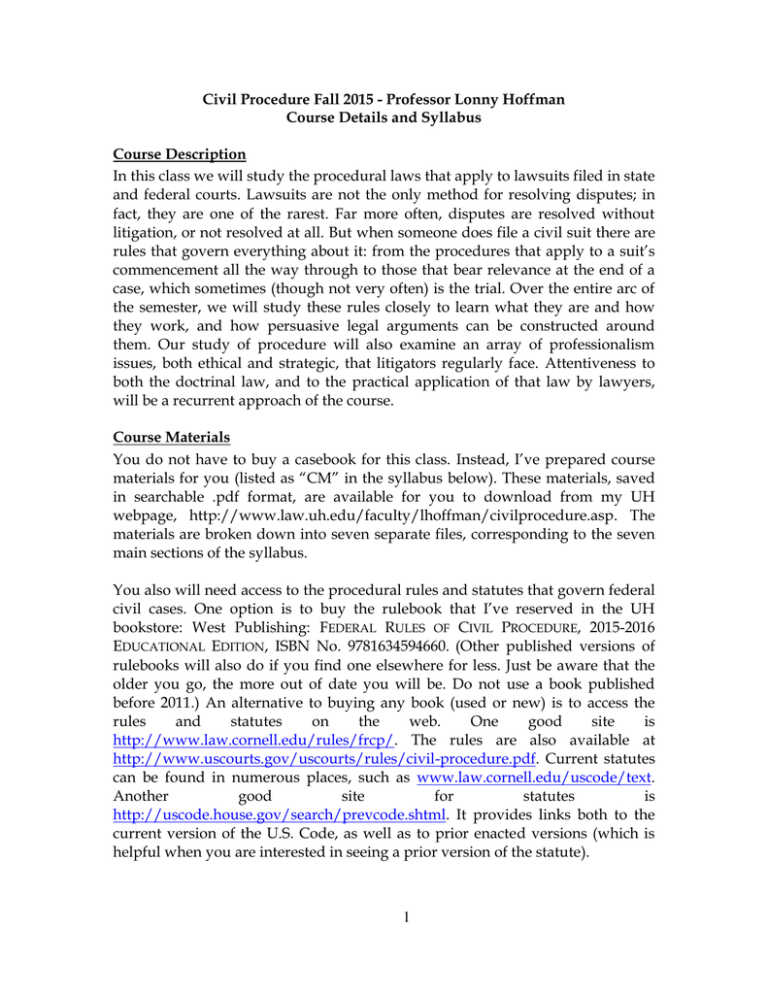
Civil Procedure Fall 2015 - Professor Lonny Hoffman Course Details and Syllabus Course Description In this class we will study the procedural laws that apply to lawsuits filed in state and federal courts. Lawsuits are not the only method for resolving disputes; in fact, they are one of the rarest. Far more often, disputes are resolved without litigation, or not resolved at all. But when someone does file a civil suit there are rules that govern everything about it: from the procedures that apply to a suit’s commencement all the way through to those that bear relevance at the end of a case, which sometimes (though not very often) is the trial. Over the entire arc of the semester, we will study these rules closely to learn what they are and how they work, and how persuasive legal arguments can be constructed around them. Our study of procedure will also examine an array of professionalism issues, both ethical and strategic, that litigators regularly face. Attentiveness to both the doctrinal law, and to the practical application of that law by lawyers, will be a recurrent approach of the course. Course Materials You do not have to buy a casebook for this class. Instead, I’ve prepared course materials for you (listed as “CM” in the syllabus below). These materials, saved in searchable .pdf format, are available for you to download from my UH webpage, http://www.law.uh.edu/faculty/lhoffman/civilprocedure.asp. The materials are broken down into seven separate files, corresponding to the seven main sections of the syllabus. You also will need access to the procedural rules and statutes that govern federal civil cases. One option is to buy the rulebook that I’ve reserved in the UH bookstore: West Publishing: FEDERAL RULES OF CIVIL PROCEDURE, 2015-2016 EDUCATIONAL EDITION, ISBN No. 9781634594660. (Other published versions of rulebooks will also do if you find one elsewhere for less. Just be aware that the older you go, the more out of date you will be. Do not use a book published before 2011.) An alternative to buying any book (used or new) is to access the rules and statutes on the web. One good site is http://www.law.cornell.edu/rules/frcp/. The rules are also available at http://www.uscourts.gov/uscourts/rules/civil-procedure.pdf. Current statutes can be found in numerous places, such as www.law.cornell.edu/uscode/text. Another good site for statutes is http://uscode.house.gov/search/prevcode.shtml. It provides links both to the current version of the U.S. Code, as well as to prior enacted versions (which is helpful when you are interested in seeing a prior version of the statute). 1 Class Schedule This class will meet on Tuesdays and Thursdays from 6:00-7:15 pm, and Wednesdays from 7:30–8:15 pm. The ABA requires that all four-credit classes meet at least 2,800 minutes over the course of the semester. With 40 scheduled class sessions, by holding class for 75 minutes, we could miss up to two classes without having to reschedule them if bad weather or some other unanticipated event causes us to cancel class (38 classes x 75 minutes each = 2,850 minutes). Classroom Time I use several different teaching styles in class. Some days are mostly lecture and discussion classes. The best preparation for these class days is just to read the assigned material carefully before we meet. On other class days we will go over specific practice problems that are in your course materials. You will get the most out of these classes by preparing the problems in advance. As the syllabus indicates, you are required to turn in some problems before class to your assigned teaching assistant. Other problems are for you to work on your own; we’ll discuss these together in class. Of course, the more you put into all the problems, the more you will get out of the class time we spend going over them. Attendance and Participation The school’s academic rules and I require that you attend at least 80% of the classes. As we have discussed, this semester you can also attend class virtually by watching the video of the class. You can watch and participate live, or you can watch them later; either way counts as having attended class for attendance purposes. However, because this is a first-year class, you may not attend virtually for more than a third of all the classes (12-13 class sessions). Also, as we have discussed, you cannot attend virtually on one of our role play days (whether you are assigned a role or not). This means that if you do not attend class in person on one of our designated role play classes, then that’s an absence that cannot be made up virtually. I may lower a final grade or take other appropriate disciplinary action (up to entering a failing grade) if it is determined that a student is absent from more than 20% of the classes. I treat the sign-in sheet that I circulate each class period as presumptive evidence that you were there (or not there). [Note: if you attend class virtually, you should keep a record of those days so that you can demonstrate, if asked, that you did not exceed more than the one-third limit, described above. Since we have 40 regularly scheduled classes, you should not miss more than 8 class sessions.] School rules allow me to improve a student’s grade by as much as one-third of a letter grade based on class performance (e.g., from B to B+). Keep in mind that in-class performance is based on the overall quality, not quantity, of your participation. Typically, only a handful of students 2 earn this participation increase. On rare occasions, I’ve reduced a student’s grade for failure to attend or participate. Grading The final examination is on December 7, 2014 from 6:00-10:00 pm. It will be an inclass, open book examination comprised of two medium-length essay questions (worth 80% of the final exam grade) and 20 multiple-choice questions (worth the remaining 20% of the exam grade). Most of my past exams are available by going to this link on my webpage: http://www.law.uh.edu/faculty/main.asp?PID=179. We also will be working many practice exam problems throughout the semester to help you prepare for the final. I will give you more details about the exam during the semester. The Teaching Assistant Program for this Course I use a unique teaching assistant program in this class that the vast majority of my former students have told me they find very helpful. We are fortunate to have four teaching assistants who will be working with us this semester. I will introduce all of them and discuss the teaching assistant program in depth when we meet on the first class day. Contact Information and Office Hours My office is BLB 124, which is in the faculty suites on the first floor of BLB. Feel free to stop by during my office hours (Tuesdays and Thursdays from 4:45-5:45 pm) or call/email in advance to schedule an appointment at another convenient time. Phone is (713) 743-5206; email is lhoffman@central.uh.edu. My assistant is Charlette Jefferson. Her phone is (713) 743-2120; her email is cmjeffer@central.uh.edu. Course Syllabus Below is the detailed course outline and syllabus. You can use it as a roadmap for where we will be going during the semester. The dates are estimates of when we will get to this material. To help you plan in advance, heavier-than-usual reading assignments are listed in bold. 3 Class #1- August 25 In advance of our Aug 25 class read: I. Introduction to Civil Procedure · Mary Brigid McManamon, The History of the Civil Procedure Course: A Study in Evolving Pedagogy (CM 1-6), article publicly available at http://works.bepress.com/mary_brigid_mcmanamon/1/ A. Introduction to the Course and Overview of Course Themes · Paul MacMahon, Proceduralism, Civil Justice and American Legal Thought (CM 7-8), article publicly available at http://papers.ssrn.com/sol3/papers.cfm?abstract_id=2279153 · Lonny Hoffman, A Parting Reprise (CM 9-23), article publicly available at http://papers.ssrn.com/sol3/papers.cfm?abstract_id=898240 · Stephen Shapiro, Teaching First-Year Civil Procedure and Other Introductory Courses by the Problem Method (CM 24-26), article publicly available at http://papers.ssrn.com/sol3/papers.cfm?abstract_id=1426113 · Suggested (optional) additional assignment in advance of Aug 27 class: Watch Full Faith and Credit, video by Columbia Law Review students, at http://www.youtube.com/watch?v=0XgObo75Y0Q (warning: if this were a movie, it would surely be given an R rating). Class #2- August 26 B. How Lawyers Use Procedure as Strategy; American Reliance on Private Enforcement of Law Class #3- August 27 C. Adoption of the Rules, and Rulemaking In advance of our Aug 26 class read: · Charles Adams, World-Wide Volkswagen v. Woodson – The Rest of the Story (CM 27-34) (permission granted by author to use). ·Burbank, Farhang and Kritzer, Private Enforcement (CM 35-39), article publicly available at http://papers.ssrn.com/sol3/papers.cfm?abstract_id=2325579 In advance of our Aug 27 class read (Note: I have bolded the reading assignment for this class to indicate that it is heavier than usual; not so much because of the number of pages you have to read, but because of the density of subject matter covered): · Subrin, How Equity Conquered Common Law: The Federal Rules of Civil Procedure in Historical Perspective (CM 40-46), article publicly available at http://papers.ssrn.com/sol3/papers.cfm?abstract_id=2084735 · Thomas Main, Traditional Equity and Contemporary Procedure (CM 47-51), article publicly available at http://papers.ssrn.com/sol3/papers.cfm?abstract_id=421320 · Mulligan and Staszewski, The Supreme Court’s Regulation of Civil Procedure; Lessons from Administrative Law (CM 52-53), article publicly available at http://papers.ssrn.com/sol3/papers.cfm?abstract_id=1897864 4 Sept 1 Class #4- Sept 2 II. The Civil Lawsuit A. Notice Pleading No scheduled class on this day. In advance of our Sept 2 class read: · Questions to Think About in Advance of Discussion of Notice Pleading (CM 54) · Fed. R. Civ. P. 8 and 9, as well as Form 11 (which you can find in the Appendix of Forms following the rules) · Swierkiewicz Opinion and Plaintiff’s Complaint (CM 55-71). Note: you can skim through the complaint; it’s included mostly for illustrative purposes. · Start to familiarize yourself with the PowerPoint presentation on pleading (available on my Procedure webpage). We will go over it in more detail together. (Note: embedded in the PowerPoint are three short movie clips that won’t play for you; we will see them together in class.) · Ashcroft v. Iqbal (CM 72-89) Class #5- Sept 3 (continue prior discussion of notice pleading) Suggested (optional) video to watch on pleading standards: http://www.youtube.com/watch?v=e9nn-bhcBp0 In advance of our Sept 3 class read: · Burbank, et al, Private Enforcement of Statutory and Administrative Law (CM 90-94), article publicly available at http://papers.ssrn.com/sol3/papers.cfm?abstract_id=1781047 · Brian Fitzpatrick, Twombly and Iqbal Reconsidered (CM 95-101), article publicly available at http://papers.ssrn.com/sol3/papers.cfm?abstract_id=2091622 · Coleman v. John Moore Services (CM 103-05) · Kidwell v. Digital Intelligence Systems (CM 106-09) · Guzman v. Hacienda Records and Recording Studio (CM 110-11) · Alex Reinert, Measuring the Impact of Plausibility Pleading (CM 112-15), article publicly available at http://papers.ssrn.com/sol3/papers.cfm?abstract_id=2603273 Class #6- Sept 8 In advance of our Sept 8 class: (continue prior discussion of notice pleading) · Discuss in class Practice Problem for Notice Pleading- Problem #1 (CM 116). You will not turn in any answer; we will just work the problem together in class. 5 Class #7-Sept 9 In advance of our Sept 9 class: (continue prior discussion of notice pleading) · In advance of class, I will assign roles for arguing Practice Problem For Notice Pleading- Problem #2 (CM 117). You will not turn in any answer Suggested (optional) additional reading: · Arthur Miller, From Conley to Twombly to Iqbal: A Double Play on the Federal Rules of Civil Procedure, 60 Duke L. J. 1 (2010), article publicly available at http://scholarship.law.duke.edu/dlj/vol60/iss1/1/ · Lonny Hoffman, Rulemaking in the Age of Twombly and Iqbal, article publicly available at http://papers.ssrn.com/sol3/papers.cfm?abstract_id=2123325 Class #8- Sept 10 In advance of our Sept 10 class B. Motions, Answers and Affirmative Defenses · Read Rules 8(b) and 8(c), 12(b)(6), 12(c) and 12(e) 1. Defendant’s Answer and (some) Rule 12 Motions: Rules 12(b)(6), 12(c) and Rule 12(e) Class #9-Sept 15 2. Rule 11: Certifications and Sanctions · Read Defendant’s Answer from Madrigal v. Kerry, Inc. (CM 118-120). Note: Just skim; this is for illustrative purposes only · Prepare Exercise on Timing and Waiver (CM 121). You do not need to turn anything in. Prepare only for class discussion purposes. In advance of our Sept 15 class read: · Questions to Think About in Advance of Discussion of Rule 11 (CM 122) · Fed. R. Civ. P. 11 and text of advisory committee notes accompanying 1983 and 1993 amendments · Excerpt from Lonny Hoffman, The Case Against the Lawsuit Abuse Reduction Act of 2011 (CM 123-140), article publicly available at http://papers.ssrn.com/sol3/papers.cfm?abstract_id=1807123 6 Class #10-Sept 16 In advance of our Sept 16 class read: C. Amendments · Rule 15 · Start to familiarize yourself with the PowerPoint presentation on Rule 15 (available on my Procedure webpage). We will go over it in more detail together. · Susan Hauser, The 2009 Amendment to Federal Rule 15(a)(1) – A Study in Ambiguity (CM 141-146), article publicly available at http://papers.ssrn.com/sol3/papers.cfm?abstract_id=1929795 · On Track Innovations v. T-Mobile (CM 147-156) · Spencer v. Wal-Mart (CM 157-159) Class #11-Sept 17 In advance of our Sept 17 class read: (continue prior discussion of amendments) · Anderson v. Bondex (CM 160-167) Class #12-Sept 22 · Robert Lusardi, Rule 15(c) Mistake: The Supreme Court in Krupski…, (CM 168-174), article publicly available at http://papers.ssrn.com/sol3/papers.cfm?abstract_id=1971291 In advance of our Sept 22 class: (continue prior discussion of amendments) · Prepare Practice Problem for Amendments (CM 175-176). Turn in your answer to your TA before class. In advance of class, I will assign roles for arguing the problem together in class. Class #13-Sept 23 In advance of our Sept 23 class read: D. Joinder of Claims and Parties; and Counterclaims and Cross-Claims · Rules 13, 14, 18, 19, 20 and 23 · Mary Kay Kane, Original Sin and the Transaction in Federal Civil Procedure (CM 177-181), article publicly available at http://librarysource.uchastings.edu/repository/Kane/76TexLRev172 3.pdf ·Douglas McFarland, Seeing the Forest for the Trees (CM 182-189), article publicly available at http://papers.ssrn.com/sol3/papers.cfm?abstract_id=1957388 7 Class #14-Sept 24 (continue prior discussion of joinder of claims and parties, counterclaims and cross-claims) In advance of our Sept 24 class, prepare Problem on Joinder and Amendments (CM 190). Turn in your answer to your TA before class. . In advance of class, I will assign roles for arguing the problem together in class. Class #15-Sept 29 In advance of Sept 29 class: III. Personal Jurisdiction, Venue, and Related Issues · Read Questions to Think About in Advance of Reading Pennoyer v. Neff (CM 191) A. Introduction to Personal Jurisdiction: the Traditional Conception of Jurisdiction · Read Pennoyer v. Neff (CM 192-198) · Read Wendy Collins Perdue, What’s “Sovereignty” Got To Do With It? Due Process, Personal Jurisdiction, and the Supreme Court (CM 199-202), article publicly available at http://files.sclawreview.org/volumes/63/3/63.3(13)perdue.pdf Suggested (optional) short video to watch about personal jurisdiction: http://www.youtube.com/watch?v=QBpz-mQ2QeQ Class #16- Sept 30 In advance of our Sept 30 class, read: B. The Evolution of the Constitutional Personal Jurisdiction Doctrine · International Shoe v. Washington (CM 203-209) · Excerpt from Lonny Hoffman, The Case Against Vicarious Jurisdiction (CM 210-211), article publicly available at http://papers.ssrn.com/sol3/papers.cfm?abstract_id=893652 Suggested (optional) short video to watch (fun video): http://www.youtube.com/watch?v=e6L90oN4ppY Class #17-Oct 1 In advance of our Oct 1 class, read: C. Long Arm Statutes and Other Non-Constitutional Limits on Judicial Jurisdiction · Gray v. American Radiator (CM 212-217) · Ohio Long Arm Statute (CM 218) · Rule 4(k)(1)(a) 8 Class #18-Oct 6 D. The Modern Test for Constitutional Amenability to Suit General Jurisdiction Class #19-Oct 7 In advance of our Oct 6 class, read: · DaimlerChrysler v. Bauman (CM 219-229) 1. In advance of our Oct 7 class, read: · Burger King v. Rudzewicz (CM 230-237) 2. Specific Jurisdiction: Intentional Wrongs and Contract Cases Class #20-Oct 8 (continue prior discussion of constitutional limits on personal jurisdiction) Class #21-Oct 13 3. Specific Jurisdiction: Product Liability Cases · Walden v. Fiore (CM 238-251) In advance of our Oct 8 class, prepare Practice Problem for Personal Jurisdiction (CM 252-253). Turn in your answer to your TA before class. In advance of class, I will assign roles for arguing the problem together in class. In advance of our Oct 13 class, read: · World-Wide Volkswagen case v. Robinson (CM 254-258) · Questions to Think About in Advance of Reading McIntrye (CM 259) · McIntyre v. Nicastro (CM 260-280) · Adam Steinman, The Lay of the Land: Examining the Three Opinions in J. McIntyre… (CM 281-287), article publicly available at http://papers.ssrn.com/sol3/papers.cfm?abstract_id=2049896 9 Class #22-Oct 14 In advance of our Oct 14 class, read: E. Choice of Forum, Exclusive Jurisdiction and Mandatory Arbitration Provisions · Carnival Cruise Lines v. Shute (CM 288-290) · Linksys Terms and Conditions, eBay User Agreement (CM 291-296) (just skim; included mostly for illustrative purposes) · AT & T v. Concepcion (CM 297-302) · Excerpt from Jean Sternlight, Tsunami (CM 303-306), article publicly available at http://law.uoregon.edu/org/olr/volumes/90/3/docs/Sternlight.pdf · Excerpt from Eisenberg et al, Arbitration’s Summer Soldiers (CM 307312), article publicly available at http://papers.ssrn.com/sol3/papers.cfm?abstract_id=1076968 Suggested (optional) video to watch on a motion to dismiss brought to enforce an arbitration agreement. Note: this video is an actual hearing brought in a federal court. You certainly should not watch the whole thing, but you may find it helpful to watch a portion to get a sense of how lawyers might argue this kind of motion: http://www.uscourts.gov/Multimedia/Cameras/DistrictofMassachu setts.aspx?video_uuid=csrj2487&categoryId=53247 Class #23-Oct 15 In advance of our Oct 15 class read: F. Constitutional Requirements for Notice · Read Jones v. Flowers (CM 313-319) · Read Fed. R. Civ. P. 4 Class #24-Oct 20 · Prepare Notice Practice Problem (Fall 2007 exam question) (CM 320). You do not need to turn anything in; prep only for discussion purposes. In advance of our Oct 20 class G. Venue · Read 28 U.S.C. § 1391 · Prepare Venue Problems (CM 321). You do not need to turn anything in; prep only for discussion purposes. 10 Class #25-Oct 21 In advance of our Oct 21 class · 28 U.S.C. §§ 1404, 1406 H. Transfer of Venue · Atlantic Marine Constr. v. U.S. District Court (CM at 322-338) Suggested (optional) short video to watch on venue transfers (Note: this video was created by Prof Angela Upchurch (Capital Univ) for her Procedure students): http://www.youtube.com/watch?v=E8M8CkYlHDg Class #26-Oct 22 I. Forum Non Conveniens In advance of our Oct 22 class read · Questions to Think About in Advance of Piper Aircraft v. Reyno (CM 339) · Piper Aircraft (CM 340-348) · Start to familiarize yourself with the PowerPoint presentation on FNC (available on my Procedure webpage). We will go over it in more detail together. Class #27-Oct 27 (continue prior discussion of FNC) In advance of our Oct 23 class prepare Practice Question for FNC (to be distributed). Turn in your answer to your TA before class. In advance of class, I will assign roles for arguing the problem together in class. Optional suggested reading: Excerpt from Lonny Hoffman, Forum Non Conveniens in Federal Statutory Cases, article publicly available at http://papers.ssrn.com/sol3/papers.cfm?abstract_id=898854 Class #28-Oct 28 In advance of our Oct 28 class read: IV. Subject Matter Jurisdiction and Related Issues · Mas v. Perry (CM 349-353) A. Diversity Jurisdiction · Hertz v. Friend (CM 354-366) · U.S. Const. Article III, §2; 28 U.S.C. §1332 11 Class #29-Oct 29 B. Federal Question Jurisdiction In advance of our Oct 29 class, read: · U.S. Const. Article III, §2; 28 U.S.C. §1331 · Louisville & Nashville R.R. Co. v. Mottley (CM 367-368) · Grable v. Darue Eng. (CM 369-379) Class #30-Nov 3 (continue prior discussion of federal question jurisdiction) In advance of our Nov 5 class prepare Practice Question for Federal Question Jurisdiction (to be distributed). Turn in your answer to your teaching assistant before class. . In advance of class, I will assign roles for arguing the problem together in class. Optional suggested reading: Excerpt from Lonny Hoffman, Intersections of State and Federal Power: State Judges, Federal Law and the “Reliance Principle”, 81 TUL. L. REV. 283 (2006), article publicly available at http://papers.ssrn.com/sol3/papers.cfm?abstract_id=886725 Class #31-Nov 4 In advance of our Nov 4 class read: C. Supplemental Jurisdiction · UMW v. Gibbs (CM 380-382) · Read Exxon Mobil Corp. v. Allapattah Services, Inc (CM 383-401) · 28 U.S.C. §1367 Class #32-Nov 5 In advance of our Nov 5 class, (continue prior discussion of supplemental jurisdiction) · Prepare Practice Problem on Supplemental Jurisdiction (to be distributed). You do not need to turn anything in; prep only for discussion purposes. Class #33-Nov 10 In advance of our Nov 10 class, read: D. Removal · 28 U.S.C. §§ 1441, 1446 · Martin v. Franklin Capital (CM 402-410) Suggested (optional) video to watch on motions to remand. Note: this video is an actual hearing on a motion to remand brought in a federal court. You certainly should not watch the whole thing, but you may find it helpful to watch a portion to get a sense of how lawyers might argue this kind of motion: http://www.uscourts.gov/Multimedia/Cameras/SouthernDistrictofI owa.aspx?video_uuid=mjud83r9&categoryId=59995 12 Class #34-Nov 11 In advance of our Nov 11 class read: V. The Choice of Law Problem in Federal Court: Federal or State Law · Erie Railroad v. Tompkins (CM 411-414) · 28 U.S.C. §§ 1652, 2071, 2072 Class #35-Nov 12 · Adam Steinman, What is the Erie Doctrine? (CM 415-421) article also publicly available at http://papers.ssrn.com/sol3/papers.cfm?abstract_id=1115336 In advance of our Nov 12 class read (in this order): VI. Discovery · Rules 26(a)(1), (a)(2) and (a)(3), A. Introduction to Discovery and Overview of Discovery Mechanisms · Rule 16(b) · Read the rest of Rule 26 · Rules 27, 30, 31, 33, 34, 35, 36, and 37 B. Special Consideration of Electronic Discovery · Start to familiarize yourself with the PowerPoint presentation on Discovery (available on my Procedure webpage). We will go over it in more detail together. Also read: · Withers and Latin, Living Daily With Weekley Homes (CM 422-424) article also publicly available at www.litigationsection.com · Raymond, Tackling E Discovery on a Budget (CM 425-428) article also publicly available at www.litigationsection.com · Epperson E-Discovery/In-House (CM 429-431) article also publicly available at www.litigationsection.com Class #36-Nov 17 In advance of our Nov 17 class, read: C. What Do We Know About Discovery Use and Abuse · Lee & Willging, Defining the Problem of Cost in Federal Civil Litigation (CM 432-455) article also available at http://scholarship.law.duke.edu) D. Proposed Amendments to Discovery Rules · Readings on Proposed Amendments to Discovery Rules (CM 456471). Note: Just skim this reading material. We will discuss key points in class). · Optional, suggested reading: Lonny Hoffman, The Case Against LARA 2011, article publicly available at http://papers.ssrn.com/sol3/papers.cfm?abstract_id=1807123, pp. 13-20 and 29-31 13 Class #37-Nov 18 In advance of our Nov 18 class, read: · Questions to Think About in Advance of Hickman v. Taylor and Upjohn cases (CM 472) E. Attorney-Client Communications, Work Product and Experts · Hickman v. Taylor (CM 473-480) · Upjohn v. United States (CM 481-487) · Fed. R. Civ. P. 26(b)(3) and (b)(4) · Prepare Discovery Practice Exercises (CM 488-489). You will not turn in an answer. Prepare the problem only for class discussion purposes. Class #38-Nov 19 In advance of our Nov 19 class read: VII. Judgment As A Matter of Law: Summary Judgment · Celotex v. Catrett (CM 490-493) · Scott v. Harris (CM 494-506) · Fed. R. Civ. P. 56 Class #39-Nov 24 In advance of our Nov 24 class (continue prior discussion of summary judgment) · Read Tolan v. Cotton (CM 507-517) · Prepare Practice Question on Summary Judgment (CM 518). You will not turn in an answer. Prepare the problem only for class discussion purposes. Dec 1 Class #40-Dec 3 No scheduled class on this day This will be our last official class day. It will be devoted to course summation and review for the final exam. 14
